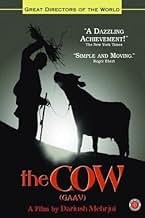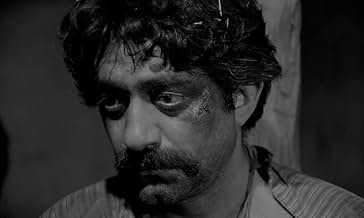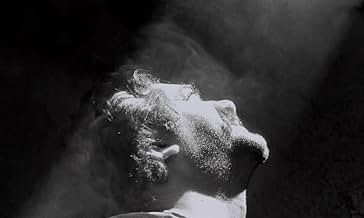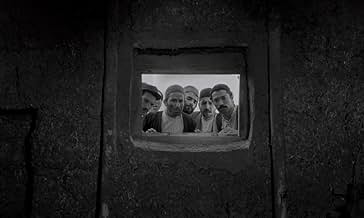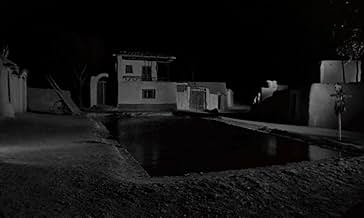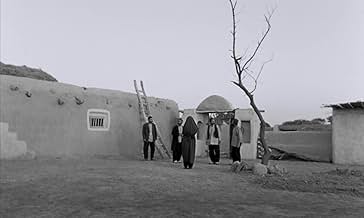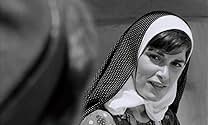IMDb RATING
7.8/10
8.5K
YOUR RATING
An old villager deeply in love with his cow goes to the capital for a while. While he's there, the cow dies and now the villagers are afraid of his possible reaction to it when he returns.An old villager deeply in love with his cow goes to the capital for a while. While he's there, the cow dies and now the villagers are afraid of his possible reaction to it when he returns.An old villager deeply in love with his cow goes to the capital for a while. While he's there, the cow dies and now the villagers are afraid of his possible reaction to it when he returns.
- Director
- Writers
- Stars
- Awards
- 2 wins & 1 nomination total
- Director
- Writers
- All cast & crew
- Production, box office & more at IMDbPro
Featured reviews
This movie is about as far as one can get from Hollywood blockbusters. Its about a cow. About a cow and a very loving owner. And what happens to them ultimately. There's melancholy and madness in the tragic ending. But the movie also scales new heights in the bonding between human and animals, in this case, a cow. The camera has been used is a surreal way. Shadows and people mix creating a spookiness which adds to the oddity of the general environment depicted. There's very palpable tension in the movie, created by the elements related to the cow and the three shadowy thieves who perhaps symbolize lawlessness. What also struck me was the looming silence of the black burkah-clad women and occasion glimpses of their crinkly faces. All very surreal. There are some very interesting personalities which come alive through the script, other than the cow of course!
"The cow" (1969) from Dariush Mehrjui can be called (with a little exaggeration) the founding film of Iranian (art house) cinema. In an interview Mehrjui told that the Italian neorealists were his big examples in making this film.
Dariush Mehrjui was born in 1939. He is therefore a contemporary of Bahram Beizai (born 1938) and Abbas Kiarostami (born 1940). Nevertheless Mehrjui is THE director of Iran before the Islamic Republic of 1979.
"The cow" tells the story of a man losing his only cow. Caring for this cow was the cornerstone of his life and the source of his status in the village. The theme of the film is the reaction of the man to his misfortune and the way the villagers cope with his reaction.
In this time of professional psychiatric treatment maybe there is something to be learn from the degree of involvement of the villagers with their neigbour. Hoewever the schocking final scene shows what can happen when involvement turns into powerlessness.
Apart from the man with the cow there are a lot of other things happening in the village. They are hinted at, but we can not speak of elaborated sub-plots. There is for example a couple in love probing every opportunity to be together unnoticed. The glances they exchange speak for themselves. After all this film was made before the Islamic revolution of 1979.
Dariush Mehrjui was born in 1939. He is therefore a contemporary of Bahram Beizai (born 1938) and Abbas Kiarostami (born 1940). Nevertheless Mehrjui is THE director of Iran before the Islamic Republic of 1979.
"The cow" tells the story of a man losing his only cow. Caring for this cow was the cornerstone of his life and the source of his status in the village. The theme of the film is the reaction of the man to his misfortune and the way the villagers cope with his reaction.
In this time of professional psychiatric treatment maybe there is something to be learn from the degree of involvement of the villagers with their neigbour. Hoewever the schocking final scene shows what can happen when involvement turns into powerlessness.
Apart from the man with the cow there are a lot of other things happening in the village. They are hinted at, but we can not speak of elaborated sub-plots. There is for example a couple in love probing every opportunity to be together unnoticed. The glances they exchange speak for themselves. After all this film was made before the Islamic revolution of 1979.
this film from 1960s and we should attend this masterpiece about a man and his life his problems his troubles we can discuses about influence of this film on thinking of people about human and all around things we can discuss about importance this movie to in Iranian cinema in 40 years ago and it director and actors are some of best of cinema history this film from 1960s and we should attend this masterpiece about a man and his life his problems his troubles we can discuses about influence of this film on thinking of people about human and all around things we can discuss about importance this movie to in Iranian cinema in 40 years ago and it director and actors are some of best of cinema history
This simple tale is open to interpretation, which can be considered positively or otherwise it perhaps hearkens back to folk tales which are passed down orally, and contain simple plots which are then the basis of discussion. In this way it is easily remembered and its meanings can be deciphered afterwards by those who watch it. However it also means that the film seems overlong for the most part, pre-occupied with repeating sequences and behaviour again and again, and even drawing out the fairly dramatic ending which arguably diminishes its strength. Perhaps it would have been better presented in a shorter runtime, or a more heavily stylised manner such as that of the title sequence. Nevertheless, regardless of enjoyment there are many threads of discussion that can be considered.
One of the key questions raised by the film is that of the mental stability of the protagonist, Hassan, whose loss of his animal will bring about his somewhat metamorphosis into the same creature. At the start of the film he is seen behaving extremely strangely as he leads his cow back to town, exultantly dancing around it as he washes and caresses it. This man is not behaving as the other people (such as the children) do. Hassan is mirrored somewhat by the town idiot, who is berated by the other people, and even locked up so as to keep Hassan himself from learning the secret of his cow's death. This mirroring, and Hassan's transformation, make it possible to consider the village's relationship to both Hassan and his cow certainly throughout neither are treated with respect, and the film's end highlights this.
Perhaps Mehrjui, the film's creator, comments on the actual importance of the cow and this man's relationship, an idea that is supported by the title of the piece.
One of the key questions raised by the film is that of the mental stability of the protagonist, Hassan, whose loss of his animal will bring about his somewhat metamorphosis into the same creature. At the start of the film he is seen behaving extremely strangely as he leads his cow back to town, exultantly dancing around it as he washes and caresses it. This man is not behaving as the other people (such as the children) do. Hassan is mirrored somewhat by the town idiot, who is berated by the other people, and even locked up so as to keep Hassan himself from learning the secret of his cow's death. This mirroring, and Hassan's transformation, make it possible to consider the village's relationship to both Hassan and his cow certainly throughout neither are treated with respect, and the film's end highlights this.
Perhaps Mehrjui, the film's creator, comments on the actual importance of the cow and this man's relationship, an idea that is supported by the title of the piece.
The Cow, Gaav (1969) is the second feature film by director Dariush Mehrjui. It was the second film to be financed by the Shah of Iran but promptly banned after completion when the Shah felt its portrayal of simple village life in Iran gave the wrong impression to outsiders. The film was smuggled out of Iran in 1970, and subsequently won "critics choice" at the Venice Film Festival.
The Cow (originating from a novel by Iranian author Gholam-Hossein Saedi) portrays the obsession, loss of faith and demise of a poor rural village that loose their single salable commodity - a cow. Hassan, played by Ezatollah Entezami (who received best actor at the Chicago Film Festival), has a face that vividly captures his physical and emotional change after a breakdown when he becomes the cow. Mehrjui uses theater actors with "compelling faces" as key elements in the cinematography (Feridun Ghovanlu), as did the Italian Neo-realist.
The film explores the looming fear of a foreign invader as the villagers come to believe Hassan, in his cow-like state, will be captured in cross-border raids from rival tribes. Politically this is reminiscent of the Shah's constant allusions to the neighboring "Arab threat" over oil.
While set in traditional, rural Iran, Mehrjui shows an alternative view of Iran where collective fear and poverty can cycle in hopeless desperation. Viewers of The Cow are left to question the very root of human dignity.
The Cow (originating from a novel by Iranian author Gholam-Hossein Saedi) portrays the obsession, loss of faith and demise of a poor rural village that loose their single salable commodity - a cow. Hassan, played by Ezatollah Entezami (who received best actor at the Chicago Film Festival), has a face that vividly captures his physical and emotional change after a breakdown when he becomes the cow. Mehrjui uses theater actors with "compelling faces" as key elements in the cinematography (Feridun Ghovanlu), as did the Italian Neo-realist.
The film explores the looming fear of a foreign invader as the villagers come to believe Hassan, in his cow-like state, will be captured in cross-border raids from rival tribes. Politically this is reminiscent of the Shah's constant allusions to the neighboring "Arab threat" over oil.
While set in traditional, rural Iran, Mehrjui shows an alternative view of Iran where collective fear and poverty can cycle in hopeless desperation. Viewers of The Cow are left to question the very root of human dignity.
Did you know
- TriviaFinanced largely by the Shah's government, the producers were aghast at the finished film as they felt that it made Iran look like it was a completely backwards country. The film was only allowed to be released with a disclaimer attached stating that the events depicted happened long before the then existing regime.
- GoofsWhen a woman goes to Mash Hassan to get milk, a man tells her that one cow is all they have in the village. This should be impossible because a female cow cannot get pregnant on her own and lactate.
- Quotes
Masht Hassan: I'm not Hassan. I'm his cow.
- ConnectionsFeatured in Cinema Iran (2005)
- How long is The Cow?Powered by Alexa
Details
- Runtime
- 1h 44m(104 min)
- Color
- Sound mix
- Aspect ratio
- 1.37 : 1
Contribute to this page
Suggest an edit or add missing content

